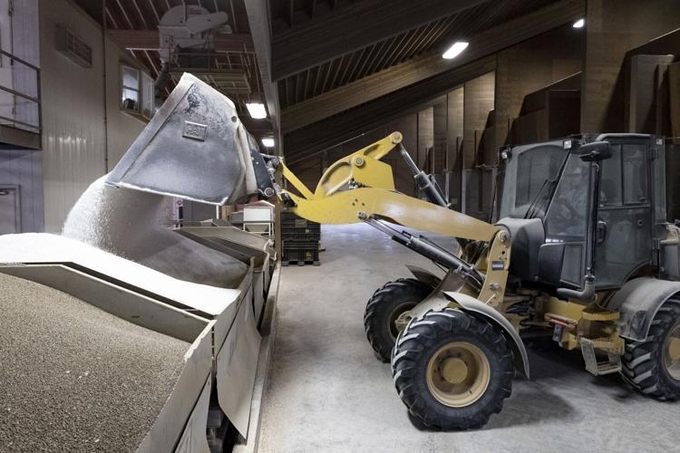November 27, 2025 | 22:01 GMT +7
November 27, 2025 | 22:01 GMT +7
Hotline: 0913.378.918
November 27, 2025 | 22:01 GMT +7
Hotline: 0913.378.918

Fertilizer prices reached all-time highs in 2022, and energy and natural gas prices remain elevated and volatile.
Issues stemming from supply chain disruptions, trade policies, higher energy prices and the ongoing Ukraine-Russia war have thrown the market for fertilizer higher. Natural gas, an ingredient in some fertilizers, has seen rising prices in Europe as it depends on Russia for nearly a third of its supply. Prices are approximately seven times higher than they were a year ago.
“The outlook on fertilizer prices remains pessimistic with a series of factors contributing to elevated prices,” said John Beghin, economist with the University of Nebraska, in an article for Nebraska Agricultural Economics. “Although affordability may slightly improve as long as commodity prices decrease more slowly than fertilizer prices do.”
The silver lining with the issues affecting fertilizer prices, Beghin said, is those same factors are helping support higher crop prices. That makes the cost of inputs easier to swallow in some cases.
While prices are expected to be high, it isn’t causing any changes in approach quite yet for some farmers in the U.S.
“There was no problem getting the fertilizer right now, but just getting the checkbook out can be hard,” said Washington, Iowa, farmer Michael Vittetoe.
However, the southeast Iowa farmer said he is watching what happens along the Mississippi River and whether that will impact supply at all. Low levels have caused a backup of barges along the southern portion of the river which may slow transportation in the ag industry for a time.
“That’s a little bit different,” he said. “We are a long ways away from next year, but it will be interesting to see how that goes.”
Regardless, Vittetoe said farmers will likely take the practical approach to decisions in the 2023 season. If prices are high, they will adjust as needed, but large-scale changes aren’t likely.
“It always comes down to profitability and what makes sense agronomically,” he said. “The amount of dollars grains have gone up, inputs are still priced at a point where they are still paying for themselves within reason.
“I think it’s cutting back on people with excess use of inputs because people won’t throw money down the drain for no reason. You want to be more on target with everything which is a good thing from an environmental standpoint.”
Gary Schnitkey, economist with the University of Illinois, echoed those thoughts in an article for farmdoc Daily. He said the high fertilizer prices are likely to stay until 2023, if not longer, which means reducing application rates is “prudent.”
“Phosphorus and potassium applications can be reduced or eliminated if soil test levels are sufficiently high,” he said.
He also noted that some farmers may consider waiting on their 2023 purchases until the spring in hopes fertilizer prices will decline. While that may be the case, he noted that corn, natural gas and anhydrous ammonia prices are very much related. As one goes, the other will follow.
“Much can change between now and spring,” Schnitkey said. “A cold winter likely would lead to higher natural gas prices. Events in the Ukraine-Russia war also will have a bearing on prices. Splitting nitrogen purchases is a sound risk-management strategy in this situation.”
World Food Forum calls to keep trade in fertilizers open and increase their affordability and accessibility for farmers
Market transparency is crucial when it comes to trade in fertilizers since reduced availability and accessibility, interruption of supply chains and soaring prices jeopardize farmers’ ability to grow food and push more people to the brink of hunger, FAO Director-General QU Dongyu said at a special event of the World Food Forum. The event entitled “Global Assessment and Solutions for the Fertilizer Crisis” aimed to assess the current market situation with fertilizers and potential science-based solutions that could help to cope with this critical situation.
To ensure smooth trade in fertilizers, the Director-General highlighted the need for strengthening political will, solidarity and collaboration among all members. Warning about possible negative environmental effects from misuse or overuse of fertilizers, Qu also encouraged countries to invest in big data and soil nutrition maps and monitoring and improve fertilizer use efficiency.
(SCJ; WWF)

(VAN) A new study reveals how the simultaneous effects of ocean acidification, salinity and loss of oxygen are making the world more fragile.

(VAN) Hopes are growing that the creation of the first 3D turkey gut model could be a turning point in the battle against the virulent blackhead disease.

(VAN) Tyson, America’s biggest meat supplier, plans to shutter one of its largest beef processing plants as the industry continues to struggle with low cattle supplies and political pressure from Washington.

(VAN) New FAO study shows how digital solutions are empowering farmers and fishers to prevent losses and build resilient agrifood systems.

(VAN) Brazil's COP30 presidency pushed through a compromise climate deal on Saturday that would boost finance for poor nations coping with global warming but that omitted any mention of the fossil fuels driving it.

(VAN) Poultry farmers in the UK have been warned that they could face one of the worst winters yet for bird flu.

(VAN) Prices of main-crop paddy have risen sharply, with jasmine rice hitting 16,100 baht per tonne — the highest level in years.